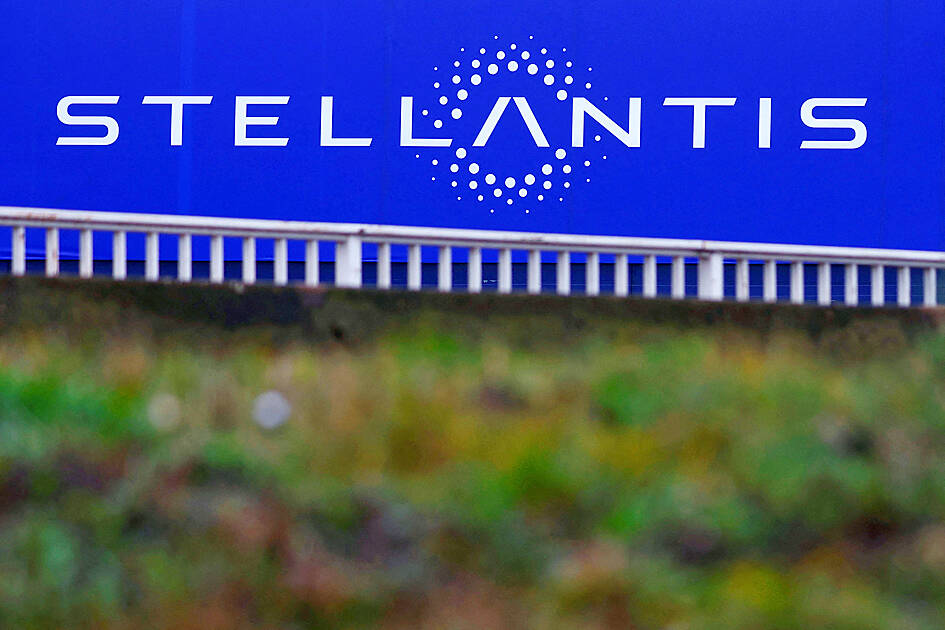A Chinese joint venture producing Jeep sports utility vehicles for Stellantis NV is to file for bankruptcy, the European automaker said yesterday, after complaints last month that political tensions with the West were affecting the business environment.
Stellantis NV chief executive officer Carlos Tavares had said the auto giant would consider ending production in China, questioning whether the stability of relations between Beijing and the world could be guaranteed.
Shareholders have given their approval for the joint venture to file for bankruptcy as it is “in a loss-making context,” Stellantis said in a statement.

Photo: Reuters
The company would continue providing services to existing and future Jeep customers in China, it said.
The automaker had terminated the Jeep joint venture with local partner Guangzhou Automobile Group Co (GAC, 廣州汽車集團) in July, and is in talks with local partner Dongfeng Motor Group Co (東風汽車) about its Peugeot and Citroen brands.
In a further step back from the world’s biggest auto market, Stellantis’ Opel brand in September said it was pausing a planned expansion in China.
The Jeep joint venture’s “assets were no longer sufficient to pay off all debts,” GAC said in a filing to the Hong Kong stock exchange yesterday, confirming that the venture would file for bankruptcy.
“Affected by factors including decline in product competitiveness, [the GAC-Stellantis venture’s] production and operations have gradually fallen into difficulties,” GAC said.
Unlike German rival Volkswagen AG, which sold 3 million vehicles in China last year, Stellantis has never broken through there.
The company aims for revenue of 20 billion euros (US$19.8 billion) in China by 2030 with its 14 brands, but Tavares last month complained of unequal treatment from Beijing.
“The red carpet is rolled out for Chinese manufacturers in Europe, and that’s not how we’re welcomed in China,” he told reporters at the Paris Motor Show.

UNCERTAINTIES: Exports surged 34.1% and private investment grew 7.03% to outpace expectations in the first half, although US tariffs could stall momentum The Chung-Hua Institution for Economic Research (CIER, 中華經濟研究院) yesterday raised its GDP growth forecast to 3.05 percent this year on a robust first-half performance, but warned that US tariff threats and external uncertainty could stall momentum in the second half of the year. “The first half proved exceptionally strong, allowing room for optimism,” CIER president Lien Hsien-ming (連賢明) said. “But the growth momentum may slow moving forward due to US tariffs.” The tariff threat poses definite downside risks, although the scale of the impact remains unclear given the unpredictability of US President Donald Trump’s policies, Lien said. Despite the headwinds, Taiwan is likely

When Lika Megreladze was a child, life in her native western Georgian region of Guria revolved around tea. Her mother worked for decades as a scientist at the Soviet Union’s Institute of Tea and Subtropical Crops in the village of Anaseuli, Georgia, perfecting cultivation methods for a Georgian tea industry that supplied the bulk of the vast communist state’s brews. “When I was a child, this was only my mum’s workplace. Only later I realized that it was something big,” she said. Now, the institute lies abandoned. Yellowed papers are strewn around its decaying corridors, and a statue of Soviet founder Vladimir Lenin

UNIFYING OPPOSITION: Numerous companies have registered complaints over the potential levies, bringing together rival automakers in voicing their reservations US President Donald Trump is readying plans for industry-specific tariffs to kick in alongside his country-by-country duties in two weeks, ramping up his push to reshape the US’ standing in the global trading system by penalizing purchases from abroad. Administration officials could release details of Trump’s planned 50 percent duty on copper in the days before they are set to take effect on Friday next week, a person familiar with the matter said. That is the same date Trump’s “reciprocal” levies on products from more than 100 nations are slated to begin. Trump on Tuesday said that he is likely to impose tariffs

READY TO BUY: Shortly after Nvidia announced the approval, Chinese firms scrambled to order the H20 GPUs, which the company must send to the US government for approval Nvidia Corp chief executive officer Jensen Huang (黃仁勳) late on Monday said the technology giant has won approval from US President Donald Trump’s administration to sell its advanced H20 graphics processing units (GPUs) used to develop artificial intelligence (AI) to China. The news came in a company blog post late on Monday and Huang also spoke about the coup on China’s state-run China Global Television Network in remarks shown on X. “The US government has assured Nvidia that licenses will be granted, and Nvidia hopes to start deliveries soon,” the post said. “Today, I’m announcing that the US government has approved for us